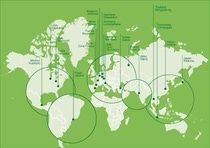Media
BASF spurs production of sustainable palm oil products
- 20 production sites worldwide now certified according to the RSPO standard
- BASF is Gold partner of the RSPO European Roundtable
- Good progress has been made in the changeover to certified sustainable palm oil products
BASF further strengthens its operations network for certified palm products: Meanwhile the company manufactures certified ingredients at 20 locations around the world for the cosmetic, detergent and cleaning agent industries. This production network also includes the BASF factories at Gebze (Turkey) and Dahej (India): they have now received the Supply Chain Certificate of the Roundtable on Sustainable Palm Oil (RSPO) as BASF announced on the occasion of the RSPO’s fifth annual European Roundtable in London.
Present in all key regions
“With our sites in Turkey and India, we are able to offer the optimal conditions required for changing over to certified ingredients to our customers in all key regions. It all depends just how quickly we can jointly transform the market to sustainable products along the entire value chain”, said Jan-Peter Sander, Senior Vice President BASF Personal Care Europe. Sustainability is also becoming increasingly important for manufacturers and consumers in regions such as South Asia.
120 ingredients with a “mass balance” certificate
BASF is one of the largest global manufacturers of ingredients for cosmetic products, detergents and cleaning agents as well as foodstuffs. For the manufacture of these products, mainly palm kernel oil and its derivatives – as well as to a lesser extent palm oil – are used. In Europe, the Personal Care business unit currently offers about 120 ingredients based on palm kernel oil, which have been certified according to the RSPO “mass balance” module. “Thanks to our broad portfolio of RSPO-certified ingredients, we are able to help our customers to achieve their self-committed objectives and are in a position to actively contribute to market development”, said Sander. In the past year, BASF has virtually doubled its sales of certified ingredients based on palm kernel oil. Altogether, the company processed a total of 508,000 tons of palm-based raw materials. BASF is thus one of the largest processors of palm products worldwide.
Standard sustainable palm oil products are the ultimate goal
Each year, 71 million tons of palm products are manufactured globally. Around ten percent of this is palm kernel oil. This represents approximately seven million tons of palm kernel oil, of which only about 1.3 million tons are currently RSPO-certified. For many years, BASF has advocated to make sustainable oil palm products the industry standard in the cosmetics, detergents and cleaning agent industries. The company, which has been a member of the Roundtable on Sustainable Palm Oil (RSPO) since 2004, also joined the High Carbon Stock Steering Group in 2016 in order to promote the industry activities for forest conservation.
Sustainable manufacture of palm oil is possible
“We have made some good progress in 2016 in the changeover to certified ingredients for the cosmetics industry, and we believe that sustainable manufacture of palm oil is possible. A reliable certification system and the best possible transparency are the key factors in protecting forests with a high carbon content”, said Jan-Peter Sander. In April, the company published its Palm Progress Report during a second dialog event with palm experts in London. In this report, BASF describes the market developments and its progress in implementing BASF’s palm oil commitments. As a partner of the RSPO European Roundtable this year, BASF is continuing this dialog. At the meeting of European suppliers, processors and producers of palm oil products from all over Europe, BASF was involved in exchanging information with representatives from all along the supply chain and in developing new approaches for projects with small farmers and local communities.
Further information on the RSPO European Roundtable is available at: www.carecreations.basf.com/promotion.
About BASF´s Care Chemicals division
The BASF division Care Chemicals offers a broad range of ingredients for hygiene, personal care, home care, industrial & institutional cleaning, and technical applications. We are the leading supplier for the cosmetics industry as well as the detergents and cleaners industry and support our customers with innovative and sustainable products, solutions and concepts. The division’s high-performance product portfolio includes surfactants, emulsifiers, polymers, emollients, chelating agents, cosmetic active ingredients and UV filters. Superabsorbent polymers developed for the full spectrum of hygiene applications complete the range. We have production and development sites in all regions and are expanding our presence in emerging markets. Further information is available on the Internet at www.care-chemicals.basf.com.
About BASF
At BASF, we create chemistry for a sustainable future. We combine economic success with environmental protection and social responsibility. The approximately 114,000 employees in the BASF Group work to support the success of our customers in nearly every industry and in almost every country in the world. Our portfolio includes the segments of Chemicals, Performance Products, Functional Materials & Solutions, Agricultural Solutions and Oil & Gas. In 2016, BASF achieved a worldwide sales volume of approximately €58 billion. BASF is listed on the stock exchanges in Frankfurt (BAS), London (BFA) and Zurich (AN). More information can be found at www.basf.com.
P-17-248

